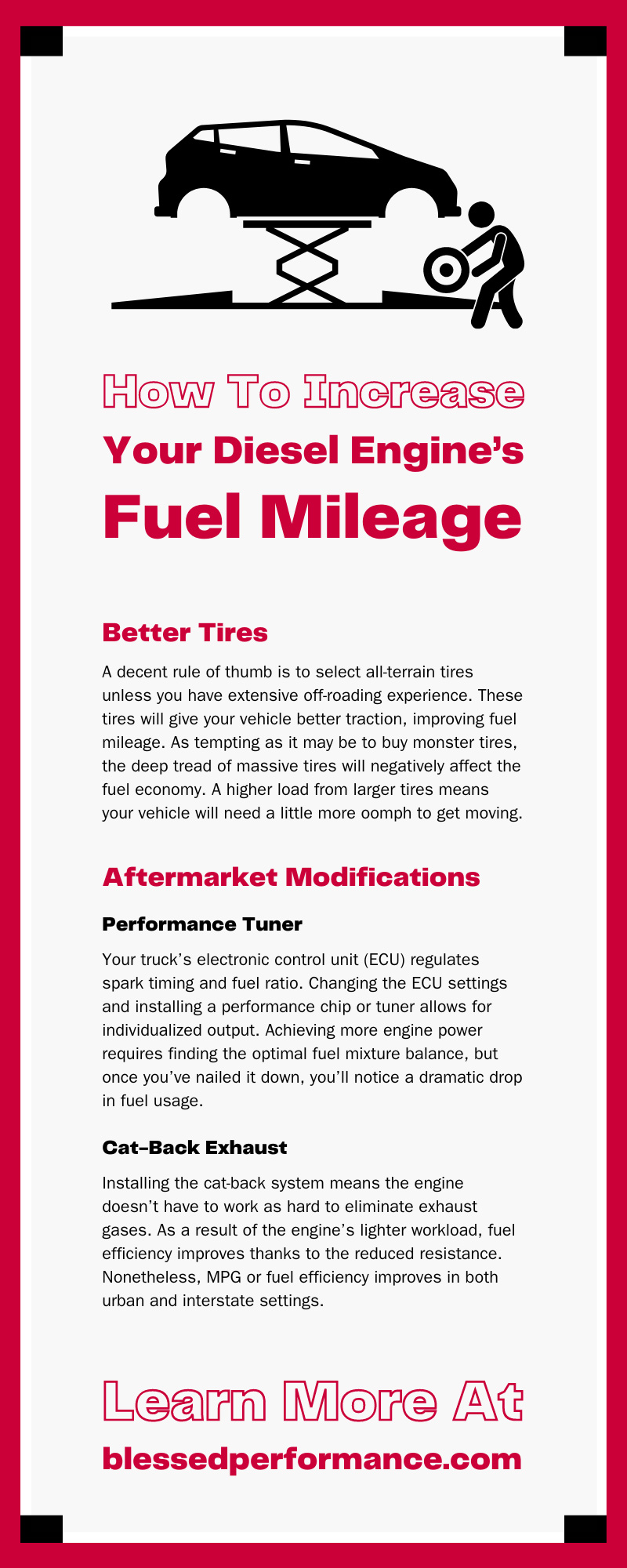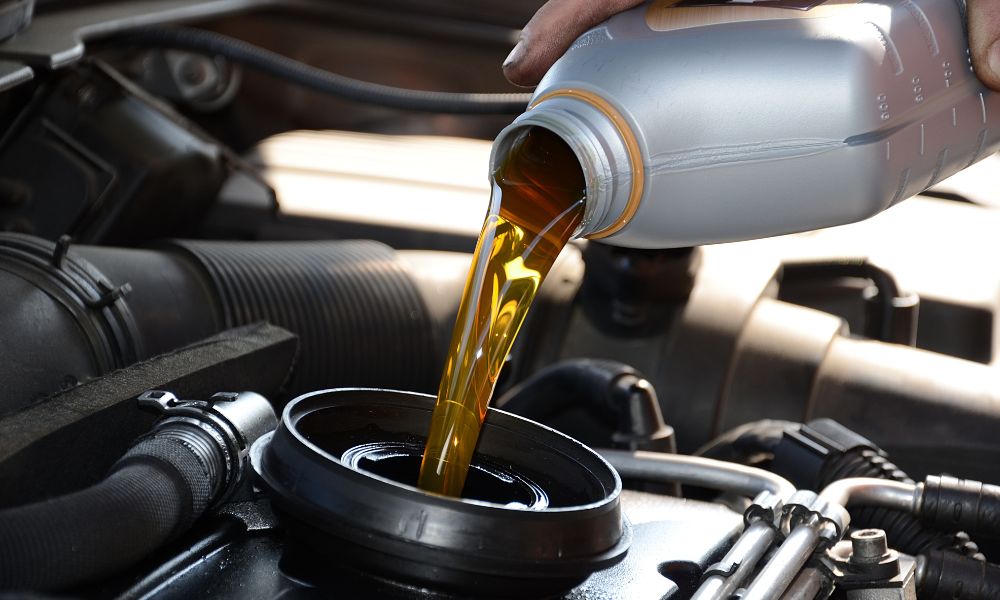How To Increase Your Diesel Engine’s Fuel Mileage
11th Apr 2023
It’s never a good feeling to fill up your diesel truck. As the dollar amount rises on the fuel pump, some small doubts may creep in about why you got the vehicle in the first place. However, finding ways to increase your diesel engine’s fuel mileage reduces those trips to the pump and casts away those negative thoughts.
Better Tires
Let’s work from the outside inward to improve your fuel mileage, beginning with one of the biggest culprits—your tires. Depending on your intended usage for your diesel-powered vehicle, you may have the wrong tires to handle the job, as the tire’s weight capacity and maximum speed are crucial factors.
A decent rule of thumb is to select all-terrain tires unless you have extensive off-roading experience. These tires will give your vehicle better traction, improving fuel mileage. As tempting as it may be to buy monster tires, the deep tread of massive tires will negatively affect the fuel economy. A higher load from larger tires means your vehicle will need a little more oomph to get moving.
The last thing worth noting about tires is their PSI (pounds per square inch) levels. You could have the best tires underneath you, but they are meaningless if underinflated. If that TPMS sensor goes off, it’d be wise to investigate and see which tire is the problem.
Aftermarket Modifications
Settling with the OEM parts for your vehicle isn’t always the best strategy since several aftermarket modifications can work wonders. There are a few aftermarket diesel modifications worth exploring that can get you a better bang for your buck regarding fuel mileage:
Performance Tuner
Your truck’s electronic control unit (ECU) regulates spark timing and fuel ratio. Changing the ECU settings and installing a performance chip or tuner allows for individualized output. Achieving more engine power requires finding the optimal fuel mixture balance, but once you’ve nailed it down, you’ll notice a dramatic drop in fuel usage.
High-Flow Cold Air Intake System
Many diesel owners don’t hesitate to install a high-flow cold air intake system. What goes into your engine directly correlates to how well it runs and how efficiently it consumes fuel. A vehicle’s performance might suffer because the manufacturer’s original intake system primarily aims to reduce noise. Changing your filter or upgrading to a cold air intake system will give your engine cooler, denser air.
Cat-Back Exhaust
Installing the cat-back system means the engine doesn’t have to work as hard to eliminate exhaust gases. As a result of the engine’s lighter workload, fuel efficiency improves thanks to the reduced resistance. Nonetheless, MPG or fuel efficiency improves in both urban and interstate settings.
Suspension Kits
Opting for diesel performance kits that alter your suspension is a sure-fire winner. Vehicles with reduced weight use less fuel. When you swap out bulky original suspension components with sleeker, lighter components, you reduce the strain on your car’s engine and save money on fuel. New high-performance struts, springs, shocks, and sway bars will save you at the pump and improve your driving experience with bettering handling.
Limit Your Loads
People prefer diesel engines for various reasons, but hauling heavy loads is one of the most prevalent motivators. For a moment, let’s pretend the classic animated film Cars is non-fiction, and your vehicle has human emotions:
Perhaps you are coming from an all-you-can-eat buffet, and you stuffed yourself to the gills. Walking without feeling the bloat slowing you down may be a chore. How would you feel if someone told you to run a mile on a full stomach? You must use all your might to make it a tenth of a mile before you crumble. That’s the same feeling your truck has when you don’t optimize your loads.
Carrying additional weight in your truck will increase your fuel consumption. Reduce your vehicle’s fuel consumption by maintaining its low weight. When driving long distances, up steep hills, or over other challenging terrains, keeping your vehicle’s load as small as possible is important.
Synthetic Oil
Confirming that your oil is at the proper level should become a part of your routine maintenance. And synthetic motor oil is the smartest decision you can make for your engine.
Synthetic diesel oils of the highest quality maintain their cleanliness and fluidity even when the temperature outside is cold. The gunk forming in the engine should be minimal because of this helpful oil. Moreover, a premier synthetic oil should improve the friction between the engine.
Many drivers may treat their oil change sticker as a recommendation instead of requiring an immediate response. But it’s critical to maintain your diesel’s effectiveness for the long haul.
An oil change with all the trimmings every 3,000-5,000 miles yields the best results. New oil helps maintain pliable seals inside the engine to avoid leaks. Diesels produce more soot and acid combustion than gas-powered cars, resulting in greater temperatures and more engine deposits.
Regular oil changes that include servicing or changing the fuel and air filters can dramatically affect your truck’s efficiency. A filthy air filter allows contaminants to enter the engine, which may reduce power and cause irreversible damage.
Your Driving Behavior
Although you have the best tires, use synthetic oil, limit your load capacity, and add the most beneficial modifications, you could nullify all those improvements because of your driving behavior. There’s a handful of things you do behind the wheel you should steer away from, and recognizing the errors in your ways could stretch out the duration before you fill up again:
- Don’t rev the engine: Try your best to quickly accelerate only when necessary. A gradual gain may be less fun, but it’s better for fuel mileage.
- Use your air conditioner in moderation: Although it’s nice to feel the cool blast hit your face on a hot summer day, driving with the windows down may be better.
- Anticipate traffic signs: Slamming on your brakes will burn more fuel than it would if you slowly came to a stop. Also, keep a safe distance between you and the vehicle in front of you. If you’re on their bumper, the odds are you’ll have to pepper your brake pedal often.
- Use cruise control: The best thing you can do for your truck is to maintain consistency. And there’s no better way to find consistency than cruise control.
Hopefully, these tips on increasing your diesel engine’s fuel mileage strike a chord, and you can make suitable changes. Blessed Performance realizes the importance of aftermarket parts for your vehicle. We may be based in Gillette, Wyoming, but we ship diesel performance parts everywhere in the United States.


